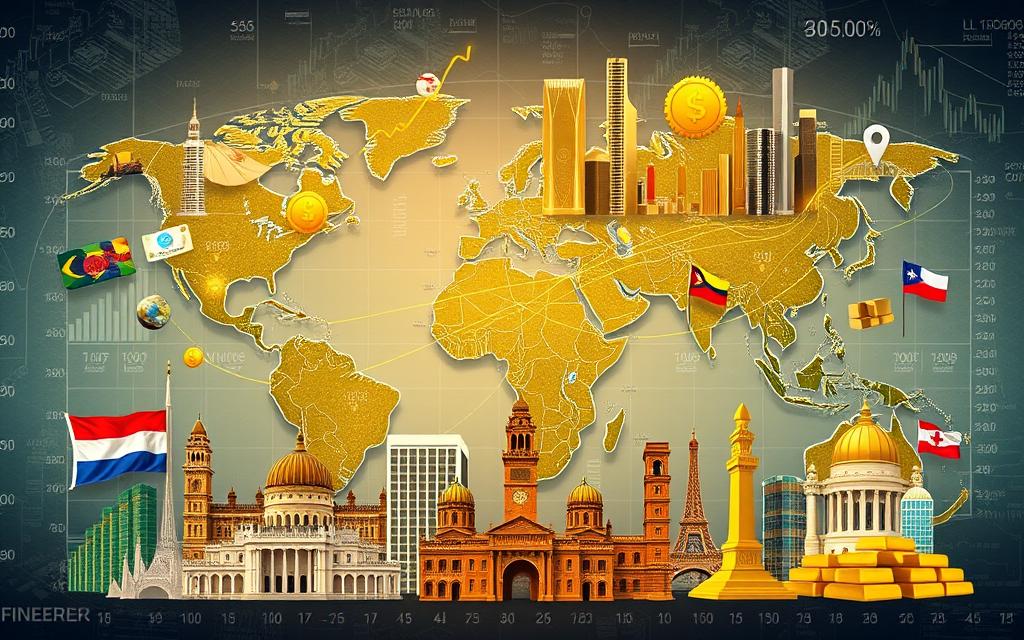The Impact of Global Events on Personal Finances: How to Stay Prepared
Household debt has grown by $3.7 trillion since December 2019, the Federal Reserve Bank reported in August 2024. This shows how global events can affect our money. It’s important for us to know the risks and the impact of global events on your personal finances and find ways to keep our finances safe.
The COVID-19 pandemic and the 2008 housing crash are examples of global events’ impact. They led to job losses, market ups and downs, and financial stress for many. A 2022 survey by Investopedia found that most Americans worry about money basics, saving for retirement, and even cryptocurrency.
It’s tough to keep up with the changing financial world. But there are steps we can take. We can manage our debt, save for emergencies, and spread out our investments. These actions can help us face the challenges of global events.
Global Economic Events and Their Financial Ripple Effects
Global economic events can affect our money in big ways. Things like recessions or trade disputes can lead to job losses and lower investment values. This makes it harder for people to get loans and can hurt our savings.
Global financial crises in big countries like the US or China can hurt jobs and incomes worldwide. Trade wars, like the one between the US and China, can make things more expensive for us. Oil price hikes, caused by conflicts, can also raise gas prices and hurt our wallets.
Events like wars or political changes can mess with global trade and markets. This creates uncertainty and can make currencies unstable. This instability can make things more expensive when we buy things from other countries or travel abroad.
Spreading out your investments can help you stay strong during tough times. Saving money and managing debt wisely are also keys. These steps can help you deal with the effects of global economic events and financial ripple effects on personal finances.
“The interconnectedness of the global economy means that events and disruptions in one part of the world can have significant consequences for individuals and households far away.” – Financial Analyst, XYZ Consultants

Knowing how global economic events can affect our money helps us make better choices. It helps us protect our personal finances and build a stronger financial future.
Build a Robust Emergency Fund in Uncertain Times
Global economic uncertainties make an emergency fund crucial for your financial health. This savings account should cover three to six months of living costs. It acts as a safety net during unexpected crises.
To start your emergency fund, first, check your current finances. Examine your monthly expenses and determine the essential living expenses. This includes rent, utilities, and food. Then, aim to save enough for three to six months.
- Focus on what’s really important: Look at your budget and cut back on non-essential spending. This will help you save more for your emergency fund.
- Choose high-yield savings: Put your emergency fund in a high-yield savings account or short-term CDs. This way, your savings can grow faster.
- Make saving automatic: Set up automatic transfers from your checking to your emergency fund. It makes saving easy and consistent.
- Use unexpected money wisely: Put any extra cash, like tax refunds or bonuses, into your emergency fund. It helps you save faster.
Building a strong emergency fund prepares you for uncertain times. It protects your financial health. Start saving now for a secure financial future.
“Having an emergency fund is like an insurance policy for your financial life. It can give you the peace of mind and flexibility to handle unexpected challenges.”

Impact of Global Events on Personal Finances
In today’s world, global crises can deeply affect your money. Job losses, reduced income, and higher expenses are common. The financial effects of world events can be huge.
When global crises affect your money, knowing the impacts is key. For example, climate disasters can damage property and raise utility bills. Also, the financial impact of global events, like economic downturns, can lead to job losses and market instability.
- The COVID-19 pandemic boosted online transactions, helping digital banking and e-commerce.
- Economic slowdowns and job losses happened due to pandemic restrictions.
- Governments worldwide gave big stimulus packages to help their economies during the pandemic.
- Geopolitical events, like Brexit, caused uncertainty in European financial markets.
It’s important to understand these impacts to prepare for and reduce financial risks from global crises. Stay informed, diversify investments, and save for emergencies. This way, you can handle the challenges of unpredictable world events better.

“Diversifying investment portfolios across various asset classes and geographies can help mitigate risks.”
Also, talking to financial advisors can offer specific advice for managing your finances during global uncertainty. By actively managing your money, you can improve your ability to face the financial impact of global events.
Strategic Financial Planning During Global Uncertainty
When the world is uncertain, planning your finances is key. Start by checking your current money situation. Then, make a budget that’s realistic and focus on what you really need. This helps you get ready for ups and downs in the market and economy.
Building an emergency fund is a smart move. Experts say to save three to six months’ worth of living costs in an easy-to-get account. This fund can help you stay stable when you lose your job, make less money, or face unexpected bills.
- Diversify your investments across different asset classes, such as stocks, bonds, real estate, and commodities, to mitigate financial risks.
- Monitor key economic indicators, including inflation rates, unemployment figures, and GDP growth, to make informed financial decisions.
- Consider seeking professional financial advice to develop a tailored strategy based on your individual goals and risk tolerance.
By using these financial planning strategies and preparing for global uncertainty, you can make your finances stronger. This way, you can handle the ups and downs of the changing economy.
“In times of uncertainty, a well-crafted financial plan can provide the stability and flexibility needed to weather any storm.”
Protect Your Assets Through Diversification
In times of global uncertainty, asset diversification is key to keeping your finances safe. By investing in different types of assets, you can lessen the impact of global events on your savings.
Experts say diversification is vital for long-term financial success and risk reduction. They recommend 15 to 20 stocks across various industries for a good mix. Yet, some think 30 different holdings are better for managing risk.
Diversification helps protect your investments and aims for balanced returns. A mix of stocks, bonds, real estate, and other assets can help your portfolio stay stable. Also, spreading investments across sectors like energy and tech can tap into different economic growth areas.
Investing globally is another smart move. It lets you benefit from growth in other countries while reducing risks tied to one place. But, remember, global investing comes with its own set of challenges like currency changes and political issues.
It’s important to regularly check and adjust your portfolio. This keeps your investments in line with your financial goals and market changes. By doing this, you can protect and grow your money, even in tough times.
“Diversification is an investment strategy aimed at reducing a portfolio’s exposure to risk and volatility.” – Financial Industry Regulatory Authority (FINRA)

In summary, asset diversification is a strong way to protect your savings during global events. By investing in a wide range of assets and sectors, you can build a strong portfolio. Regular checks and tweaks to your investments will keep your strategy on track with your long-term goals. This ensures stability and growth, even in uncertain times.
Manage Debt During Global Financial Crises
Handling personal finances during global economic troubles can be tough. But, using the right debt management strategies can help you stay afloat. It’s key to focus on essential debt payments and look into negotiating with creditors when times are tough.
Start by paying off debts like mortgages and car loans first. These are usually your top priorities. If you’re having trouble, talk to your creditors about possible hardship concessions or temporary payment breaks. Many lenders are open to helping you find a solution during hard times.
- Prioritize essential debt payments like mortgages and car loans.
- Negotiate with creditors for hardship concessions or temporary relief options.
- Consider debt consolidation to simplify and potentially lower your monthly payments.
Debt consolidation is another way to manage debt during tough times. It involves combining several debts into one, lower-interest loan. This can lower your monthly payments and make paying back easier. It can also give you a sense of relief and help you get back in control of your finances.
“The global economic crisis that emerged in 2008 in the United States caused record levels of sustained joblessness, home foreclosures, cutbacks to government services, and rising levels of poverty.”
Effective debt management during crises and financial planning strategies are crucial. By focusing on essential payments, negotiating with creditors, and looking into debt consolidation, you can face global financial crises with confidence.

Insurance and Risk Management Strategies
Having comprehensive insurance is key to safeguarding your money in uncertain times. Make sure to check and update your insurance for your property, health, and life. Also, think about getting flood insurance to cover climate risks.
Look into government-backed programs for extra financial protection. It’s important to know what your insurance covers to be ready for surprises.
- Regularly review and update your insurance policies to align with your current needs and changing global conditions.
- Explore government-backed insurance programs that may provide additional financial protection.
- Understand the fine print of your insurance policies to ensure you have the right coverage for your unique situation.
Good risk management is vital for protecting your finances in uncertain times. By spotting and tackling financial risks early, you can make your money safer.
“Effective personal finance planning through risk management can improve the long-term sustainability of savings and investment portfolios.”
Think about spreading out your investments and using hedging. Also, work with financial experts to make a solid insurance strategies and risk plan. Keep up with market news and global events to adjust your money plan as needed.

Remember, the best way to deal with global financial issues is a balanced approach to risk management. With insurance, diversification, and smart financial planning, you can safeguard your money and reach financial security in the long run.
Digital Banking and Financial Technology Solutions
In times of global uncertainty, digital banking and fintech can change how you manage money. Online and mobile banking let you access your accounts from anywhere. This is especially useful during pandemics or other disruptions.
Discover budgeting apps, investment platforms, and digital payment solutions. They help you manage your finances better and keep a safe distance when needed. EY’s 2019 Global FinTech Adoption Index shows two-thirds of consumers use at least two fintech services.
Fintech startups have seen a lot of funding, with some becoming unicorns. North America leads in fintech startups, followed by Asia and Europe. New technologies like cryptocurrency and digital tokens are being developed in fintech.
Robo-advisors, like Betterment, help with investment advice and lower costs. AI chatbots in fintech improve customer service, offering personalized financial help.
Digital banking has grown a lot, with a 65% increase in account registrations in two years. Online-only banks offer high interest rates on savings, making them attractive for managing money.
Mobile technology is key in digital banking, giving 24/7 access to banking services through apps. Blockchain improves financial security, reducing fraud and speeding up transactions.
As digital banking and fintech evolve, they will integrate with lifestyle platforms. AI and machine learning will provide personalized financial advice, shaping the future of managing money.

“The integration of fintech innovations and digital banking has revolutionized how individuals engage with financial concepts.”
By using digital banking and fintech, you can manage your money better. You’ll have access to new tools and can handle global financial challenges with confidence.
Create Multiple Income Streams for Financial Security
In today’s world, having different ways to earn money can really help. By looking into multiple income streams, you can build a strong financial safety net. This is great for when the economy goes down or if you lose your job unexpectedly.
Freelancing is a good choice. It lets you use your special skills or creative talents to earn extra money. Or, you could start a side business. This lets you use your skills and talents to make more money.
If you’re into passive income, think about dividend-paying stocks or rental properties. These can give you steady money coming in. For example, the FTSE REITs Index has seen an average return of 4.7% over the last five years.
“Diversifying income through multiple streams can lead to enhanced financial stability and security.”
Creating digital products like e-books, online courses, or software can also be a good way to earn money. It takes time and effort upfront, but can keep earning money for years.
By using personal finance strategies that focus on diversification and multiple income streams, you can build a solid financial base. This helps you stay financially secure, even when the world economy is tough.

Adapt Your Financial Strategy to Market Changes
The world of finance is always changing. It’s vital to keep up with market trends and economic indicators to adapt your financial strategy. Whether facing a global crisis or just market ups and downs, staying proactive is crucial. This helps keep your personal finance strategies strong.
It’s important to regularly check and tweak your investment portfolio, savings, and budget. Looking at changing market conditions is key. Getting financial advice from experts can help you make smart choices, even in uncertain times.
When adjusting your financial plan, consider a few things:
- Changes in interest rates and how they affect loans, mortgages, and investments
- Stock market swings and their impact on retirement funds and other investments
- Fluctuations in currency exchange rates, especially if you have assets in different currencies
- Changes in inflation rates and how they affect the cost of living
- The effects of international trade policies, like tariffs and sanctions, on prices
By keeping up with global economic trends and adjusting your financial strategies proactively, you can handle market changes better. This ensures the safety of your personal finances for the long term. Embrace flexibility and make smart choices to overcome any financial challenges.
Preparing for global events’ impact on personal finances is key. Building strong emergency funds and diversifying investments are important. Managing debt well and staying updated on economic trends also help.
Using digital financial tools and creating various income sources are vital. These steps help protect savings and ensure long-term financial stability. They help deal with the financial shocks that global events can bring.
It’s crucial to keep up with how international trade and government policies affect our money. Knowing the effects of global events helps us make smart financial choices. It lets us adjust our spending and protect our financial health.

30 Tips & Strategies on How to Stay Prepared to Mitigate the The Impact of Global Events on Your Personal Finances
Here are 30 tips and strategies for staying prepared and protecting your personal finances during global events:
1. Build an Emergency Fund
- Save at least 3–6 months’ worth of living expenses in a liquid account.
2. Diversify Your Investments
- Spread your investments across asset classes (stocks, bonds, real estate, etc.) to mitigate risks.
3. Reduce Debt
- Focus on paying off high-interest debt like credit cards to reduce financial strain during crises.
4. Create a Budget
- Adjust your budget to prioritize essential expenses and cut discretionary spending.
5. Maintain Adequate Insurance
- Ensure you have health, home, auto, and life insurance to avoid unexpected costs.
6. Keep a Cash Reserve
- Have a small amount of physical cash on hand in case of banking disruptions.
7. Stay Informed
- Follow reliable news sources to stay updated on economic and global events.
8. Avoid Panic Selling
- Don’t make impulsive investment decisions during market downturns.
9. Automate Savings
- Set up automatic transfers to savings or investment accounts to maintain consistency.
10. Reevaluate Financial Goals
- Adjust your long-term goals based on the current economic climate.
11. Invest in Recession-Proof Assets
- Consider investments in utilities, healthcare, and consumer staples, which tend to perform well during downturns.
12. Upskill or Reskill
- Enhance your job security by learning new skills that align with market demands.
13. Explore Multiple Income Streams
- Develop side hustles or freelance work to diversify your income sources.
14. Review Retirement Accounts
- Ensure your retirement portfolio is balanced and aligned with your risk tolerance.
15. Avoid Over-Leveraging
- Be cautious about taking loans or mortgages during volatile times.
16. Stockpile Essentials
- Keep a supply of basic necessities to avoid last-minute price hikes.
17. Stay Flexible
- Be ready to adjust your financial plans as global events evolve.
18. Monitor Inflation
- Adapt your spending and saving habits to account for rising prices.
19. Strengthen Credit Score
- Maintain a good credit score to secure better loan options if needed.
20. Consider Fixed-Rate Loans
- Switch to fixed-rate mortgages or loans to shield yourself from rising interest rates.
21. Avoid Unnecessary Large Purchases
- Postpone non-essential big expenses until economic conditions stabilize.
22. Invest in Gold or Commodities
- Use precious metals or commodities as a hedge against inflation and volatility.
23. Focus on Essential Skills
- Learn skills like budgeting, meal planning, and basic DIY to save money.
24. Practice Frugality
- Adopt a minimalist lifestyle and focus on needs over wants.
25. Stay Connected with a Financial Advisor
- Regularly consult with an expert to reassess your financial strategies.
26. Review Your Will and Estate Plan
- Update your legal documents to ensure your family’s financial security.
27. Utilize Tax Benefits
- Take advantage of tax credits, deductions, or deferred payment options available during crises.
28. Protect Against Cyber Threats
- Strengthen online banking and investment account security to prevent fraud.
29. Keep a Diversified Income Plan
- Consider both active and passive income sources to balance your financial risks.
30. Stay Calm and Plan Ahead
- Maintain a long-term perspective and avoid making emotional financial decisions.
These tips are designed to build resilience, manage risks, and adapt effectively to economic and global uncertainties.
Key Takeaways
- Household debt has increased by $3.7 trillion since December 2019, underscoring the significant impact of global events on personal finances.
- The COVID-19 pandemic and 2008 housing market collapse are examples of global events that have had widespread financial consequences.
- Most Americans are concerned about personal finance basics, retirement funding, and investing in cryptocurrency, according to a 2022 survey.
- Developing strategies to manage debt, build emergency funds, and diversify investments can help individuals prepare for the impact of global events.
- Staying informed about economic trends and exploring alternative income streams can also contribute to financial security during uncertain times.

Source Links
- What Is Personal Finance, and Why Is It Important? – https://www.investopedia.com/terms/p/personalfinance.asp
- 5 Ways to Prepare for a Recession | Equifax – https://www.equifax.com/personal/education/personal-finance/articles/-/learn/five-ways-to-prepare-for-a-recession/
- How Global Economic Events Affect Personal Finances – https://www.stockgro.club/blogs/personal-finance/how-global-economic-events-affect-personal-finances/
- The Impact of Global Economic Trends on Personal Investments* – https://www.onpointcu.com/blog/the-impact-of-global-economic-trends-on-personal-investments/
- How Global Economic Trends Affect Your Personal Finances – https://www.idsnews.com/article/2024/08/sponsor-how-global-economic-trends-affect-your-personal-finances
- How to Build an Emergency Fund – https://www.investopedia.com/personal-finance/how-to-build-emergency-fund/
- Emergency Savings Funds: Your Key to Weathering Life?s Storms | FNB Community Bank | Midwest City, OK – Choctaw, OK – https://www.fnbmwc.com/about/blog/post.html?cId=93630&title=what-is-an-emergency-fund
- Emergency-Proof Your Finances – https://www.investopedia.com/emergency-proof-your-finances-4800551
- The Impact of Global Events on Finance: Navigating Through Turbulent Times – https://www.linkedin.com/pulse/impact-global-events-finance-navigating-through-turbulent-dy0rf
- Council Post: Why Economic News Affects Your Personal Finances—And How To Get Informed – https://www.forbes.com/councils/forbescoachescouncil/2023/03/13/why-economic-news-affects-your-personal-finances-and-how-to-get-informed/
- Research Shows This Money Habit Can Revolutionize Your Finances – Georgetown University – https://www.georgetown.edu/news/this-money-habit-can-revolutionize-your-finances/
- How to Reduce Financial Risk During Economic Uncertainty | Holborn Assets – https://holbornassets.com/blog/investments/how-to-reduce-financial-risk-during-economic-uncertainty/
- How to Protect Your Wealth in Times of Economic Uncertainty – https://addishill.com/5-proven-strategies-to-protect-your-wealth-during-economic-uncertainty/
- The importance of a financial plan in uncertain times – https://blog.umb.com/personal-banking-guide-planning-financial-future-uncertainty/
- The Importance of Diversification – https://www.investopedia.com/investing/importance-diversification/
- What is Diversification in Investing? – https://www.businessinsider.com/personal-finance/investing/what-is-diversification
- Debt and financial crises: Will history repeat itself? – https://cepr.org/voxeu/columns/debt-and-financial-crises-will-history-repeat-itself
- PDF – https://womens-studies.rutgers.edu/images/stories/Faculty_Image/64.3.heintz.pdf
- What Is Risk Management? And How Do You Apply It To Your Finances? – https://www.forbes.com/sites/truetamplin/2023/09/29/risk-management–definition-importance-tools-best-practices/
- Why is Risk Management Important in Personal Financial Planning? – https://myfw.com/articles/why-is-risk-management-important-in-personal-financial-planning/
- Financial Risk Management Strategies – https://corporatefinanceinstitute.com/resources/career-map/sell-side/risk-management/financial-risk-management-strategies/
- Financial Technology (Fintech): Its Uses and Impact on Our Lives – https://www.investopedia.com/terms/f/fintech.asp
- Rise of Digital Banking | Impact on Modern Money Management | Liv Digital Bank by Emirates NBD – https://www.liv.me/en/blog/money-matters/rise-of-digital-bankings
- The Role of Technology in Improving Financial Literacy – Your Money Vechicle – https://yourmoneyvehicle.com/current-events/the-role-of-technology-in-improving-financial-literacy/
- Financial goals: How to set + 5 easy examples – https://academy.swissborg.com/en/learn/how-to-create-multiple-income-streams-for-financial-security
- Creating Multiple Income Streams for Financial Stability – Publish What You Pay – https://www.publishwhatyoupay.org/creating-multiple-income-streams-for-financial-stability/
- Personal Finance & Global Economics: Adapting to Changes – https://vega-financial.com/2024/01/03/personal-finance-global-economics-adapting-to-changes/
- Strategies For Adapting To Changing Financial Trends – FasterCapital – https://fastercapital.com/topics/strategies-for-adapting-to-changing-financial-trends.html
- Impact of COVID-19 on lifestyle and financial behaviour: The implications to research in financial vulnerability – https://pmc.ncbi.nlm.nih.gov/articles/PMC9792664/
- Macroeconomics and Its Impact on Personal Finance – https://www.investnrich.com/macroeconomics-and-its-impact-on-personal-finance/



